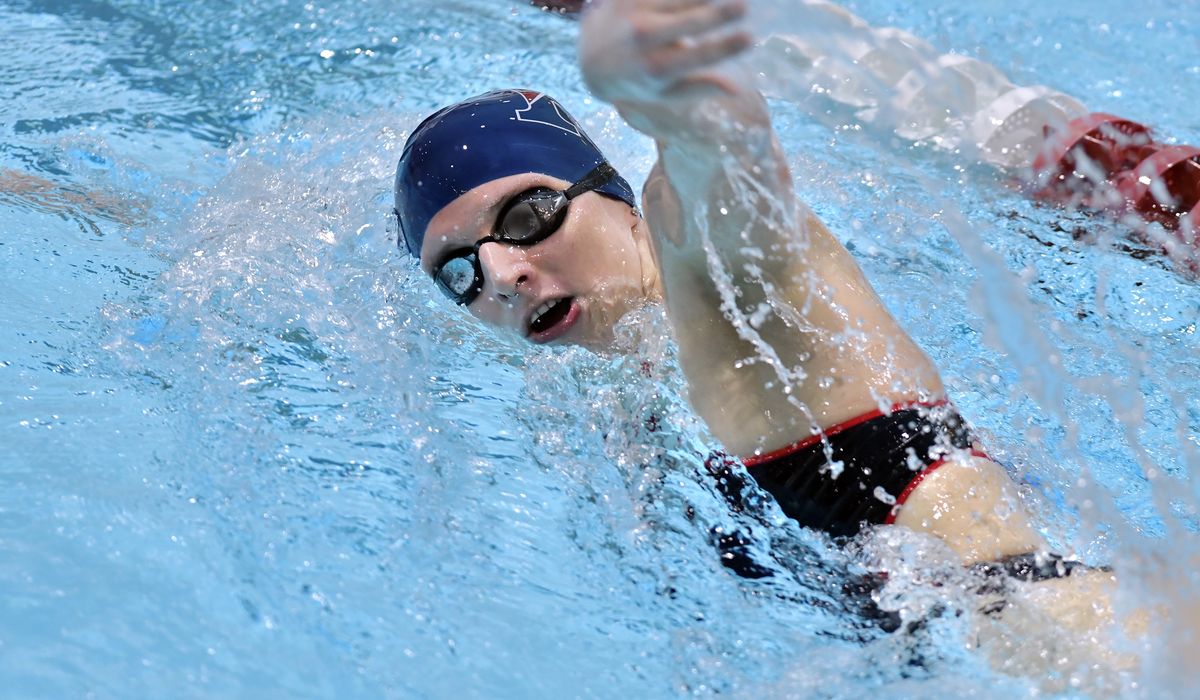
A college coaches’ association has called for the NCAA to add a slot to its swimming championships to accommodate University of Pennsylvania sensation Lia Thomas as confusion reigns over the rules on transgender competitors in collegiate sports.
The College Swimming Coaches Association of America suggested the one-time expansion after the NCAA Board of Governors voted last Wednesday to defer to national sports governing bodies on eligibility standards for transgender athletes.
“While there is a desire for swift discussion and resolutions, a thorough, thoughtful and scientific discussion about the balance of inclusion and fairness will take time,” the CSCAA said in statement last Thursday.
“Because of this situation, we call upon the NCAA Division I Competition Oversight Committee to expand this year’s championship participation cap by one spot,” the statement continued. “This would allow for both Ms. Thomas and the other cisgender women athletes who have earned the right to compete at the NCAA Championships to participate in this year’s event.”
Opening up another space would ensure that a female-born swimmer would not lose her slot to Thomas, who swam for three years on the Penn men’s team before transitioning to female and joining the women’s team for the 2021-22 season.
At the same time, the additional spot would do nothing to prevent Thomas from competing at the March championships in Atlanta, where the 22-year-old would be positioned to make a run at collegiate records held by Olympic greats Katie Ledecky and Missy Franklin.
Former USC swimming coach Dave Salo said the CSCAA idea was “not a solution at all.”
“OK, so the woman that would not get picked up in the meet because of Lia’s qualification is now picked up,” he told The Washington Times. “Now what about the woman displaced from the final 8 and the woman displaced from the consolation finals?”
A member of the American Swimming Coaches Association Hall of Fame, Salo said the “true solution, if there is one, is to offer events for those that meet the qualifying time” and have them compete against the clock, but not against the women’s field.
Stop suggesting an opposing view to this issue is hatred, bigotry, or some kind of phobia. We need to protect women athletes and Women’s sports. Decades of advancement for women athletes is at risk.
— Dave Salo (@Sprintsalo) January 21, 2022
The CSCAA, which represents about 2,000 coaches, offered up its short-term fix amid the growing concern over whose standards will govern the 2022 women’s swimming championships after the NCAA punted.
The board threw the ball into the court of USA Swimming, the national governing body. In a Thursday statement, however, USA Swimming said that it follows the international authority, the Swiss-based Federation Internationale de Natation [FINA], for elite competition.
The problem? FINA’s rules are in flux, thanks to the International Olympic Committee.
Since 2015, the IOC has recommended that male-born athletes keep their testosterone level below 10 nanomoles/Liter for at least 12 months before competing against women, but in November, the committee issued an updated framework that replaced the previous guidance.
Instead, the IOC advised international sports federations to use an “evidence-based approach” with “no presumption of advantage” for transgender athletes, adding that it was “not in a position to issue regulations that define eligibility criteria for every sport.”
As a result, FINA is working on devising its own rules for transgender athletes that may or may not be ready in time for the March 16-19 NCAA Division I women’s championships in Atlanta.
“Following broad transgender policy changes in Nov. 2021, the IOC now requires International Federations to create their own sport-specific eligibility requirements, and so we have been proactively working with FINA for several months to help shape and support their policy development efforts,” USA Swimming said. “We believe they will release a new policy shortly, which we will adopt for elite-level competitions.”
In the absence of a national or international federation policy, the NCAA board said that “previously established IOC policy criteria would be followed.”
In an email to The Washington Times, the NCAA confirmed that this means the November framework — which has no testosterone requirement.
Indeed, the NCAA may have created a window in which Thomas could compete at the Ivy League and NCAA championships without using testosterone suppressants, although that does not appear to be the organization’s intent.
In its Wednesday statement, the board also said that this year’s transgender student-athletes “will need to document sport-specific testosterone levels beginning four weeks before their sport’s championships selection,” indicating that it expects them to operate under a testosterone standard.
Under its now-discarded policy, the NCAA required such athletes to undergo testosterone suppression for at least a year before and during the women’s competition, which Thomas has done.
Thomas holds the nation’s fastest times in the 200- and 500-yard freestyle, and ranks sixth in the 1,650, fueling speculation that she could become the first transgender athlete to win a women’s Division I crown.
She added to her accolades at Saturday’s meet against Harvard, touching first in the women’s 100 and 200 freestyle races.
Penn Athletics said Thursday that it would support Thomas and “work with the NCAA regarding her participation under the newly adopted standards for the 2022 NCAA Swimming and Diving Championship.”
The CSCAA condemned “the hatred that has been directed at Ms. Thomas,” while critics of male-born competitors in women’s sports argued that were motivated by a desire for fairness, not animosity toward transgender athletes.
“Stop suggesting an opposing view to this issue is hatred, bigotry, or some kind of phobia,” tweeted Salo. “We need to protect women athletes and Women’s sports. Decades of advancement for women athletes is at risk.”








